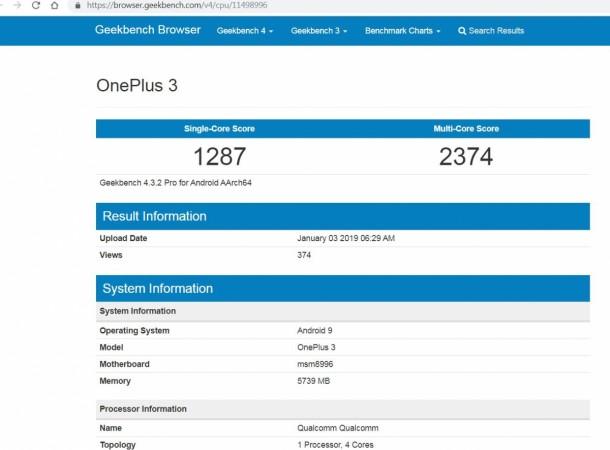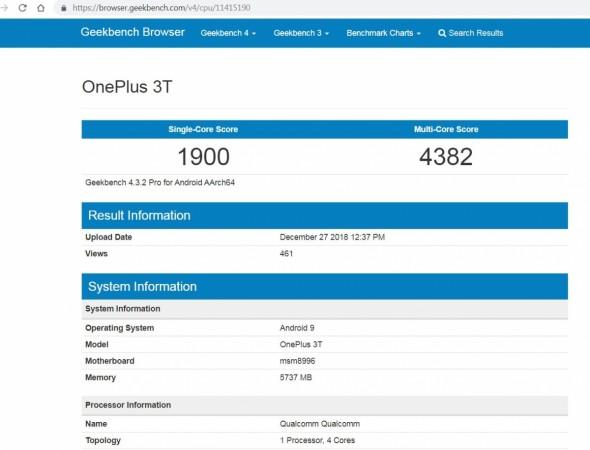In mid-2018, OnePlus took everyone by surprise announcing to release Android Pie to the 2016-series OnePlus 3 and 3T phones. This is very rare for a company to offer the latest software to old devices, while others such as Motorola are not even bothered to offer similar support for the 2018 models (Motor E5 series).
Though it is a bit delayed, OnePlus is keen to keep the promise for the loyal fans. It has reportedly started testing Android Pie for OnePlus 3 and 3T and we have the proof. Both the devices running latest software have been spotted on Geekbench confirming OnePlus has commenced testing and it is a matter of time, for the company to offer it to the public.

However, if previous release pattern is taken as any indication, OnePlus will first invite freelance programmers for open beta testing and after getting feedback, it is likely to perform one final testing before rolling out the Android Pie to all en masse, most probably by the end of February if not early.

Android Pie: All you need to know
- In addition to Google's security patch, Android 9 Pie brings numerous new safety features, including a standardized biometric authentication prompt to provide a more consistent authentication experience across Android.
- After upgrading to the Android Pie, devices will restrict any apps accessing users' phone microphone, camera, or other sensors when an app is idle or running in the background. (If an app does need to access a sensor, it will show a persistent notification on your phone.)
- The Pie update also brings important enhancements that protect all web communications and offer private web surfing. It enables encryption of Android backups with a client-side secret (the device PIN, pattern or password) for greater security.
- Other notable features include full-view screen friendly swipe-based navigation interface option, revamped setting drawer, adaptive battery and display, extend battery life and several others.
- Furthermore, Android 9 introduces several new security features, including a standardized biometric authentication prompt to provide a more consistent authentication experience across Android.
- After upgrading to the Android Pie, devices will restrict any apps accessing users' phone microphone, camera, or other sensors when an app is idle or running in the background. (If an app does need to access a sensor, it will show a persistent notification on your phone.)
- The Pie update also brings important enhancements that protect all web communications and offer private web surfing. It enables encryption of Android backups with a client-side secret (the device PIN, pattern or password) for greater security.
- One of the major highlights of Android Pie is the digital wellbeing. It brings Dashboard, which highlights screen time and phone usage including how many times the device has been unlocked and a number of notifications received so that they get an overview on how much obsessed with the phone. It also allows users to set App Timers to put limits on app usage
- Android Pie also comes with Wind Down and Do Not Disturb. With these features, users can set a daily schedule to get the phone ready for bed. Its screen fades to Grayscale, while Do Not Disturb silences notifications for a restful sleep. He/she can activate Do Not Disturb anytime they want to disconnect.
- Android Pie's Slices feature identifies relevant information of users' favourite apps to make them more easily accessible when they need them
- Android 9 Pie also makes notifications more useful and offer actionable functionalities with conversations such as attach photos and stickers along with suggesting smart replies. Also, helps users get things done faster by predicting their next move and displaying the right action on the phone.
- The new System navigation system offers a single home button that provides intelligent predictions and suggestions (user enabled).















